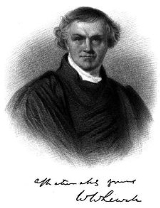
polymath
, scientist
, Anglican priest
, philosopher, theologian, and historian of science
. He was Master of Trinity College, Cambridge
.
Whewell was born in Lancaster
. His father, a carpenter, wished him to follow his trade, but his success in mathematics
at Lancaster and Heversham grammar school
s won him an exhibition
(a type of scholarship) at Trinity College, Cambridge
(1812). In 1814 he was awarded the Chancellor's Gold Medal
for poetry. He was Second Wrangler in 1816, President of the Cambridge Union Society
in 1817, became fellow and tutor of his college, and, in 1841, succeeded Dr Christopher Wordsworth
as master.
And so no force however great can stretch a cord however fine into an horizontal line which is accurately straight.![]()
We cannot observe external things without some degree of Thought; nor can we reflect upon our Thoughts, without being influenced in the course of our reflection by the Things which we have observed. ![]()
Every failure is a step to success. Every detection of what is false directs us towards what is true: every trial exhausts some tempting form of error. Not only so; but scarcely any attempt is entirely a failure; scarcely any theory, the result of steady thought, is altogether false; no tempting form of Error is without some latent charm derived from Truth.![]()
By speaking of space as an Idea, I intend to imply...that the apprehension of objects as existing in space, and of the relations of position, &c., prevailing among them, is not a consequence of experience, but a result of a peculiar constitution and activity of the mind, which is independent of all experience in its origin, though constantly combined with experience in its exercise. ![]()
Our assent to the hypothesis implies that it is held to be true of all particular instances. That these cases belong to past or to future times, that they have or have not already occurred, makes no difference in the applicability of the rule to them. Because the rule prevails, it includes all cases. ![]()
The system becomes more coherent as it is further extended. The elements which we require for explaining a new class of facts are already contained in our system. Different members of the theory run together, and we have thus a constant convergence to unity. In false theories, the contrary is the case. ![]()
Man is the interpreter of nature, science the right interpretation.![]()
In art, truth is a means to an end; in science, it is the only end.![]()
The catastrophist constructs theories, the uniformitarian demolishes them.![]()

